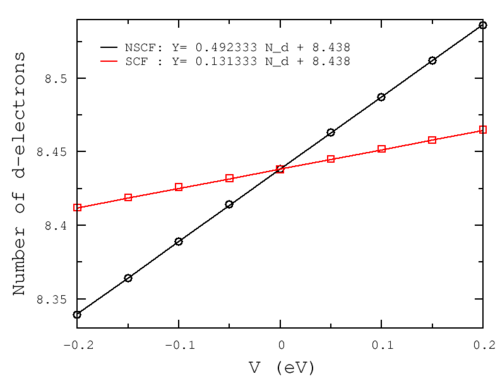Calculate U for LSDA+U: Difference between revisions
Vaspmaster (talk | contribs) |
Vaspmaster (talk | contribs) |
||
| Line 119: | Line 119: | ||
This is the change in the number of ''d''-electrons on site ''I'' due to an additional spherical potential acting on the ''d''-manifold on site ''J''. | This is the change in the number of ''d''-electrons on site ''I'' due to an additional spherical potential acting on the ''d''-manifold on site ''J''. | ||
In the following we will assume this response is zero unless ''I=J''. | In the following we will assume this response is zero unless ''I=J''. | ||
First we will | |||
{{TAGBL|ICHARG}} = 11 | {{TAGBL|ICHARG}} = 11 | ||
Revision as of 15:08, 9 August 2019
Task
In this exercise you will calculate the U parameter for the LSDA+U treatment of Ni d-electrons in NiO using the linear response ansatz of Cococcioni et al..[1]
POSCAR
For this calculation we will use a 2×2×2 supercell of AFM-II NiO:
AFM NiO 4.03500000 2.0000000000 1.0000000000 1.0000000000 1.0000000000 2.0000000000 1.0000000000 1.0000000000 1.0000000000 2.0000000000 1 15 16 Direct 0.0000000000 0.0000000000 0.0000000000 0.2500000000 0.2500000000 0.2500000000 0.0000000000 0.0000000000 0.5000000000 0.2500000000 0.2500000000 0.7500000000 0.0000000000 0.5000000000 0.0000000000 0.2500000000 0.7500000000 0.2500000000 0.0000000000 0.5000000000 0.5000000000 0.2500000000 0.7500000000 0.7500000000 0.5000000000 0.0000000000 0.0000000000 0.7500000000 0.2500000000 0.2500000000 0.5000000000 0.0000000000 0.5000000000 0.7500000000 0.2500000000 0.7500000000 0.5000000000 0.5000000000 0.0000000000 0.7500000000 0.7500000000 0.2500000000 0.5000000000 0.5000000000 0.5000000000 0.7500000000 0.7500000000 0.7500000000 0.1250000000 0.1250000000 0.1250000000 0.3750000000 0.3750000000 0.3750000000 0.1250000000 0.1250000000 0.6250000000 0.3750000000 0.3750000000 0.8750000000 0.1250000000 0.6250000000 0.1250000000 0.3750000000 0.8750000000 0.3750000000 0.1250000000 0.6250000000 0.6250000000 0.3750000000 0.8750000000 0.8750000000 0.6250000000 0.1250000000 0.1250000000 0.8750000000 0.3750000000 0.3750000000 0.6250000000 0.1250000000 0.6250000000 0.8750000000 0.3750000000 0.8750000000 0.6250000000 0.6250000000 0.1250000000 0.8750000000 0.8750000000 0.3750000000 0.6250000000 0.6250000000 0.6250000000 0.8750000000 0.8750000000 0.8750000000
Atoms 1-16 are Ni and atoms 17-32 are O.
Note that the Ni atoms are split into two groups: atom 1, and atom 2-15. This trick breaks the symmetry of the Ni sub-lattice and allows us to treat atom 1 differently from atom 2-15. Our POTCAR file has to reflect the fact that we now formally have 3 "species" (2 ×Ni + 1×O), i.e., we concatenate two Ni POTCAR files and one O POTCAR file:
cat Ni/POTCAR Ni/POTCAR O/POTCAR > POTCAR
To check whether you have a suitable POTCAR type:
grep TITEL POTCAR
This should yield something like:
TITEL = PAW Ni 02Aug2007 TITEL = PAW Ni 02Aug2007 TITEL = PAW O 22Mar2012
i.e., two Ni entries followed by one O entry.
KPOINTS
Gamma only 0 Monkhorst 1 1 1 0 0 0
The DFT groudstate
We will calculate the DFT groundstate of our NiO system with the following INCAR:
SYSTEM = NiO AFM PREC = A EDIFF = 1E-6 ISMEAR = 0 SIGMA = 0.2 ISPIN = 2 MAGMOM = 1.0 -1.0 1.0 -1.0 1.0 \ -1.0 1.0 -1.0 1.0 -1.0 \ 1.0 -1.0 1.0 -1.0 1.0 \ -1.0 1.0 -1.0 1.0 -1.0 \ 16*0.0 LORBIT = 11 LMAXMIX = 4
Instrumental here is that we correctly specify the initial magnetic moments (by means of MAGMOM-tag). The setting above is consistent with the AFM-II magnetic structure.
Secondly we set LORBIT=11: at the end of the OUTCAR file VASP will write the number of (d-) electrons per site. This information we will need to compute the U-parameter.
Last but not least, we set LMAXMIX=4: this is needed to be able to perform non-selfconsistent (ICHARG=11) LSDA+U calculations (LDAUTYPE=3) in the following. For this reason we will keep a copy of the CHGCAR file (and the WAVECAR file as well):
cp CHGCAR CHGCAR.0 cp WAVECAR WAVECAR.0
Non-selfconsistent response
The next step is to calculate the following response function:
This is the change in the number of d-electrons on site I due to an additional spherical potential acting on the d-manifold on site J. In the following we will assume this response is zero unless I=J. First we will
ICHARG = 11 LDAU = .TRUE. LDAUTYPE = 3 LDAUL = 2 -1 -1 LDAUU = 0.10 0.00 0.00 LDAUJ = 0.10 0.00 0.00
N.B.: be sure to use the charge density of the DFT groundstate calculation:
cp CHGCAR.0 CHGCAR cp WAVECAR.0 WAVECAR
Selfconsistent response
LDAU = .TRUE. LDAUTYPE = 3 LDAUL = 2 -1 -1 LDAUU = 0.10 0.00 0.00 LDAUJ = 0.10 0.00 0.00
References
Back to the main page.



